If you are visiting this page, you probably want to learn where you are most likely to be swallowed by a sinkhole.
Well, around 40% of the U.S. lie in areas prone to sinkholes.
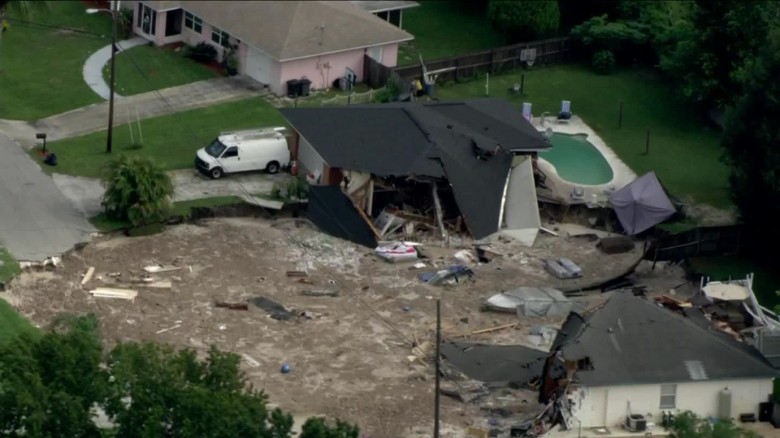
Imagine your are walking in the street and the ground suddenly collapses under your feet and you fall underground. Or imagine a crater opens up beneath your home or car and you just disappear in it. Just too frightening, isn’t it?
Although sinkholes rarely happen, they will make the headlines as mostly tragedy occurs. So you better know them to avoid them.
What Is A Sinkhole?
Sinkholes are underground cavities or craters that form when water erodes an underlying rock layer.
There are three types of sinkholes:
- One forms when the roof of a cave collapses and exposes the underground cavern.
- The second type forms when water dissolves the rock underneath soil and creates an underground chasm.
- The thrid type are man-made sinkholes, i.e. water main break, poor construction.
How and Where Do Sinkholes Form?
Sinkholes takes place where the underground rock is water-soluble such as, for example, in karst, limestone, carbonate rock and salt beds areas.
Dissolution of this ground creates caverns that will collapse when the underground spaces become too large and cannot support the land surface anymore.
Map of Sinkholes in the U.S.
As shown in this map from the U.S. Geological Survey, U.S. sinkhole risks are the highest in Florida, Texas, Alabama, Missouri, Kentucky, Tennessee, and Pennsylvania.
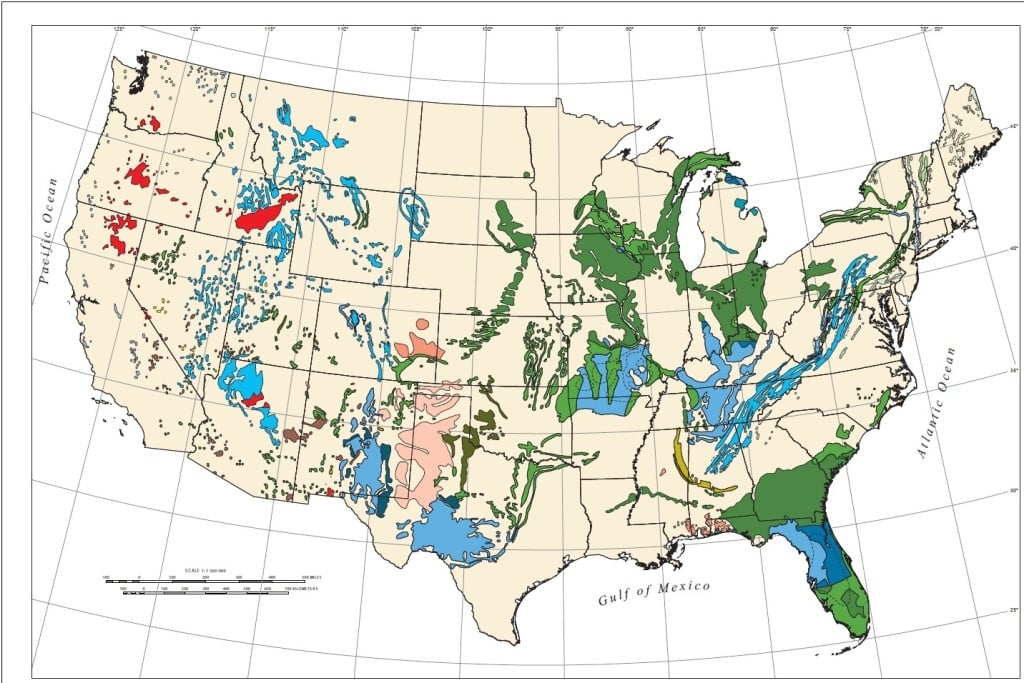
As shown in the map above, it’s not only Florida that needs to worry about sudden cave-ins and sinkholes. More than 20% of the continental U.S. is built on karst, a water-soluble rock, and is thus prone to sinkhole.
Now if you add salt and gypsum, two other water eroding rocks, more than 40% of the continental U.S. is prone to sinkholes as shown in the map below:
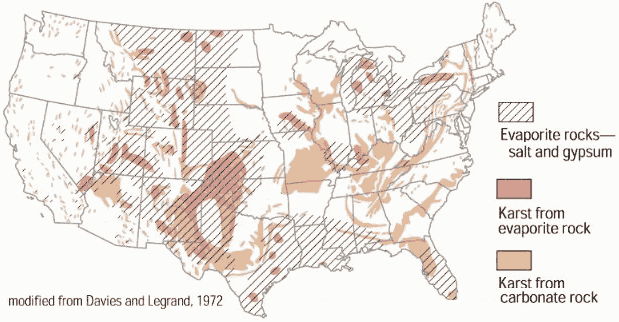
This is completely crazy, isn’t it? 40% of the U.S. underground is susceptible to dissolve in water to form catastrophic sinkholes.
These rock types are evaporites (salt, gypsum, and anhydrite) and carbonates (limestone and dolomite).
Evaporite rocks underlie about 35 to 40 percent of the United States, though in many areas they are buried at great depths.
How To Protect Against Sinkholes?
In Florida and Tennessee insurers are required to offer sinkhole coverage with home policies. If they don’t just ask.
In other states, you have to ask for it to get it. And keep in mind, if you do not have this insurance you are not covered. So if you want such a sinkhole coverage policy ask your insurer.
Lessons to take home: More than 40% of the U.S. is prone to sinkholes, not just Florida! The highest risks for sinkholes are in Florida, Texas, Alabama, Missouri, Kentucky, Tennessee, and Pennsylvania. And if you want to get covered against sinkhole damage, ask you insurer. Have a great time and don’t get swallowed by an underground crater.





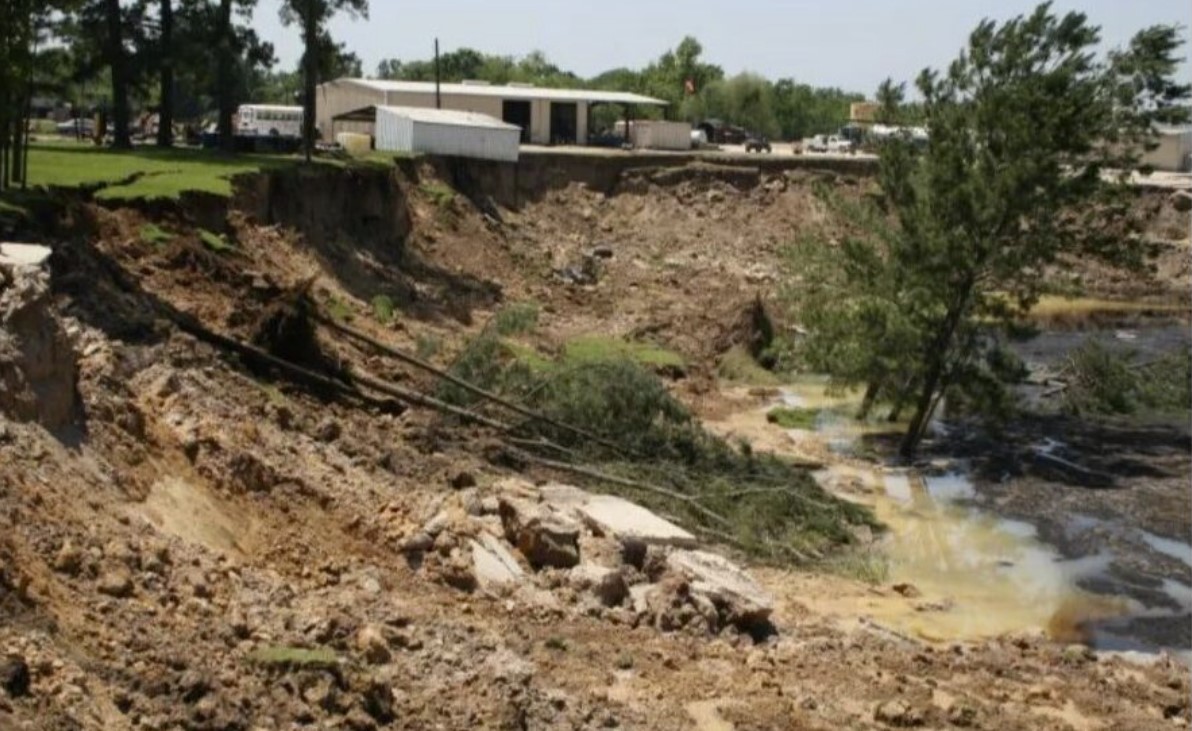


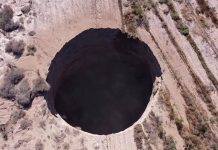

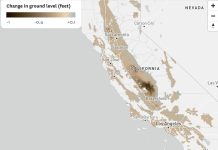


karma karma karma karma chameleon!!!!!!!!! you come and die!!!!!!!
[…] Here a map showing that more than 40% of the US is prone to sinkholes! […]
What if I know of a place that is about 2 inches round, deep and drinks water? At one time I tried to fill it with dirt but it opened back up and now I think its a little bigger. I noticed it about 30 – 40 years ago.
[…] And as shown in this map sinkhole-prone areas are widespread in the USA. […]
where do sinkholes mostly occur
I would say in Florida… But it is all where you have clay, water and oversaturation
[…] Attention this is not a Movie Review even though I talk about 2012 the movie in this presentation. Even more info included in links that I did not use. http://megashare.sc/watch-2012-online-TnpJeA http://appvoices.org/2013/06/20/new-rules-stoke-fear-of-fracking-on-public-lands/ http://www.governing.com/gov-data/energy-environment/fracking-well-by-state-map.html#.UsV1D-ohpSw.email http://www.newsfocus.org/water_grab.htm http://usnews.nbcnews.com/_news/2013/02/05/16858495-2-great-lakes-hit-lowest-water-level-on-record http://www.experienceproject.com/stories/Dislike-The-Secret-Government-Who-Rule-The-World/2574612 http://www.zengardner.com/the-plan-to-divide-and-conquer-america-at-the-new-madrid-fault-and-how-we-can-remain-free-of-crisis-engineers/ https://strangesounds.org/2013/07/us-sinkhole-map-these-maps-show-that-around-40-of-the-u-s-lies-in-a… […]
[…] Here a map of sinkhole in the USA and Mississippi isn’t too bad actually. […]
I’m thinking of buying property near Granbury, Texas. I’m concerned about the likeliness of a sinkhole in that area.
You are right. Something really big swallowed a parking lot a few months ago.
http://www.wfaa.com/story/news/local/2015/05/10/large-sinkhole-in-granbury-parking-lot/27086417/
Nobody here is talking about fracking? When something is sucked out of the ground and then something is pumped into the ground to replace it, wouldn’t it make sense that all the gaps wouldn’t be filled or that there would be erosion? Look at your fracking maps. Also, there would be noise in the area. Worth finding the secret. It has to be man-made.
Then go with your guy instinct,DON’T MOVE THERE
[…] The problems arose in this region 220 years ago with the appearance of the first salt mines. When closed, they began to gradually accumulate water which in turn has been slowly dissolving underground rock formations, creating what is known as a karst landscape. […]
[…] Yes Mississippi is prone to sinkholes! […]
[…] would say it’s about time… And it should be the same around the world! But it doesn’t mean your are […]
[…] but some areas are more prone than others, like the Tampa area. Other parts of the U.S. also have Florida Dept. of Environmental Protection overview on sinkholes Maps of Florida Sinkholes by […]
[…] Keep out of sinkhole prone areas! […]
[…] Look at these US sinkhole maps. […]
[…] One home has been evacuated and three others just temporarily. Luckily, no injuries have been reported. Learn in this map if the region you are living is prone to sinkhole like Florida is! […]
[…] Sounds… US Sinkhole Map: These Maps Show That Around 40% of the U.S. Lies in Areas Prone to Sinkholes | Stra… Actually sink holes happen in 40% of the country.. __________________ "No man is good […]
[…] Much of the western Kentucky region is underlain by karst, limestone that has been eroded to produce springs, sinking streams, caves, and sinkholes as shown in this US sinkhole map! […]
[…] View this map to know which parts of the USA are prone to sinkholes. […]